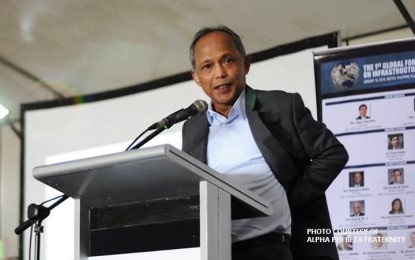
Energy Secretary Alfonso Cusi
MANILA -- Energy Secretary Alfonso Cusi on Wednesday underscored the importance of tapping energy from all possible sources, including nuclear, as the country lacks adequate capacity to date.
In his speech during the handover ceremony for the Official Phase 1 Mission Report of the Integrated Nuclear Infrastructure Review (NIR) Mission in Taguig City, Cusi said the government is continuously looking for additional sources of capacity, especially because the supply of the Malampaya gas field northwest of Palawan is expected to be depleted by 2027.
Cusi said he and several other Philippine energy officials were in China a few days ago for the petroleum exploration meeting wherein a possible tie-up is being considered to utilize resources from the West Philippine Sea.
“That effort is actually in search for Philippine energy security and we would like to tap the West Philippine Sea resources so that we can be assured of energy security especially that Malampaya will be depleted by 2027. And of course, we are all looking for other sources of energy,” he added.
Among the options that are being looked into to boost capacity is geothermal energy.
Cusi said such option should not be questioned because of the current situation.
The Energy chief also questioned the department’s earlier policy of putting a cap on the share of energy sources for the country, noting
this is “uncalled for this time”.
He said developed countries put a cap on their energy sources because they have enough energy supply.
“But the Philippines is different. We have shortage of power. We lack capacity. We need to build capacity soon otherwise we’re going to have brownouts and we don’t like that. That’s bad for the country, bad for business, bad for our economy,” he reasoned.
Cusi further said this is the reason why Philippine officials have been encouraging foreign investors to invest in the country’s power sector, among others.
For geothermal energy, he said the national position is having a policy for this source to be included in the country’s energy mix.
“From there that we will go and make this legal framework, regulatory framework,” he added.
A law is needed for this bid but Cusi said they “will go in phases” such as the survey of a third party to address gaps.
Results of the survey, which was presented during the event Wednesday, showed that the country is committed to a systematic approach to finalizing its nuclear power strategy and is completing the associated infrastructure development.
Cusi said they will meet with officials of the International Atomic Energy Agency (IAEA) by December to submit the country’s action plan on how to close the gap.
He said measures toward the move to tap geothermal energy have been delayed for three years because this is a complicated process.
He is optimistic that approval of policies and regulations will be finished within the Duterte administration, but not the materialization of the power plant itself.
The country has an existing nuclear power plant, known as the Bataan Nuclear Power Plant, although it was never used. It was constructed in the 1980s in Morong, Bataan to secure capacity following the 1973 oil crisis.
Originally, the plan was to construct a power plant with two nuclear reactors but only one reactor was constructed costing about USD2.3 billion.
The plant was mothballed on fears of similar incidents following the 1979 Three Mile Island accident in the United States and the Chernobyl disaster in what was then the Ukrainian Soviet Socialist Republic.
There were also myths about the plant’s location that energy officials have denied.
These myths include that the plant was constructed on top a fault and it was built on eruptive products on the flanks of Mount Natib, which is a dormant volcano.
“Had we adopted nuclear, the nuclear that the Philippines envisioned then, in the late 1960s or the early 70s, the Philippines economic landscape would have been different,” Cusi said.
“The project has been demonized and up to now, that is affecting us, that’s making life difficult for us. But as I’ve said before all the accusations, all the allegations about the nuclear or the BNPP have been answered by time. And we have proven them wrong,” he added. (PNA)
